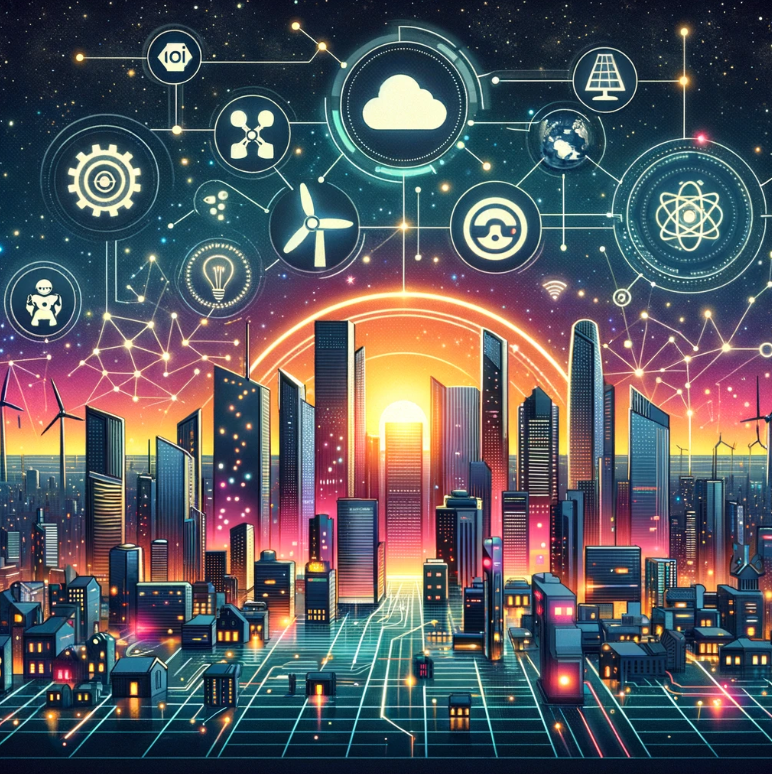Blog
- Home
- Blog
- Technology Trends
- Exploring How Technological Innovations Shape Our Future
Exploring How Technological Innovations Shape Our Future
August 06,2024

The rapid development of technology has not only changed our lifestyles and work environments but also continues to explore future prospects and possibilities. In this era of information and globalization, we are witnessing key technological trends that will shape our world in the coming years and beyond. Let's explore together the directions in which future technologies are developing and the impacts they may bring.
1. Artificial Intelligence (AI) and Machine Learning (ML)
The rapid advancement of artificial intelligence and machine learning technologies will continue to catalyze profound transformations across multiple domains. AI is no longer confined to the realm of science fiction; it has already demonstrated remarkable achievements in natural language processing, image recognition, autonomous driving, and more. Looking ahead, with advancements in algorithms and hardware technology, we can anticipate systems that are smarter and more autonomous, leading to enhanced productivity and personalized services.
2. Blockchain Technology
Blockchain technology, as a decentralized and secure method for data storage and exchange, will continue to play a pivotal role in sectors such as finance, supply chain management, and smart contracts. In the future, as blockchain applications expand, we may witness further innovations in business models and data management practices.
3. Quantum Computing
Quantum computing represents a revolutionary advancement over traditional computing, with the potential to handle complex problems and accelerate processing speeds. Despite being in the experimental stages, its applications in fields such as encryption, materials science, and artificial intelligence offer vast prospects. In the future, as quantum hardware progresses, we can expect to see more commercial applications emerge.
4. 5G Technology
5G technology will deliver faster speeds, lower latency, and increased connectivity density compared to current 4G networks, thereby fostering the development of smart cities, the Internet of Things (IoT), and augmented reality (AR) technologies. In the future, 5G will drive more intelligent and automated applications, from smart transportation to healthcare systems.
5. Virtual Reality (VR) and Augmented Reality (AR)
Virtual reality and augmented reality technologies will transform how people interact and experience learning, impacting fields such as training, entertainment, and remote work. In the future, these technologies may become indispensable parts of daily life and work.
6. Green Technology and Sustainable Development
The development of green technology will enhance energy efficiency and reduce carbon emissions, addressing challenges posed by climate change and resource limitations. In the future, we may witness more innovative clean energy technologies and environmental monitoring solutions being applied.
Conclusion
These future technological trends and developments underscore the pivotal role of technology in shaping the world ahead. As these technologies continue to advance and find broader applications, we can expect the emergence of new industries and profound changes in lifestyles and work environments. Whether in business, science, or everyday life, these technologies promise greater possibilities and opportunities while necessitating collective efforts to address corresponding ethical and societal challenges.
1. Artificial Intelligence (AI) and Machine Learning (ML)
The rapid advancement of artificial intelligence and machine learning technologies will continue to catalyze profound transformations across multiple domains. AI is no longer confined to the realm of science fiction; it has already demonstrated remarkable achievements in natural language processing, image recognition, autonomous driving, and more. Looking ahead, with advancements in algorithms and hardware technology, we can anticipate systems that are smarter and more autonomous, leading to enhanced productivity and personalized services.
2. Blockchain Technology
Blockchain technology, as a decentralized and secure method for data storage and exchange, will continue to play a pivotal role in sectors such as finance, supply chain management, and smart contracts. In the future, as blockchain applications expand, we may witness further innovations in business models and data management practices.
3. Quantum Computing
Quantum computing represents a revolutionary advancement over traditional computing, with the potential to handle complex problems and accelerate processing speeds. Despite being in the experimental stages, its applications in fields such as encryption, materials science, and artificial intelligence offer vast prospects. In the future, as quantum hardware progresses, we can expect to see more commercial applications emerge.
4. 5G Technology
5G technology will deliver faster speeds, lower latency, and increased connectivity density compared to current 4G networks, thereby fostering the development of smart cities, the Internet of Things (IoT), and augmented reality (AR) technologies. In the future, 5G will drive more intelligent and automated applications, from smart transportation to healthcare systems.
5. Virtual Reality (VR) and Augmented Reality (AR)
Virtual reality and augmented reality technologies will transform how people interact and experience learning, impacting fields such as training, entertainment, and remote work. In the future, these technologies may become indispensable parts of daily life and work.
6. Green Technology and Sustainable Development
The development of green technology will enhance energy efficiency and reduce carbon emissions, addressing challenges posed by climate change and resource limitations. In the future, we may witness more innovative clean energy technologies and environmental monitoring solutions being applied.
Conclusion
These future technological trends and developments underscore the pivotal role of technology in shaping the world ahead. As these technologies continue to advance and find broader applications, we can expect the emergence of new industries and profound changes in lifestyles and work environments. Whether in business, science, or everyday life, these technologies promise greater possibilities and opportunities while necessitating collective efforts to address corresponding ethical and societal challenges.
Article Classification
Recent Articles
- Introduction to AI Chatbots: NLP, Deep Learning, and Application Scenarios
- Security Threats in the Generative AI Era: Prompt Injection, Data Leakage, and Protection Strategies
- The Future of Live Streaming: AI, Real-Time Translation, and Metaverse Concerts
- What is a CDN? Industry Applications and Acceleration Benefits
- 5 Practical AI Tools to Boost Work Efficiency: Essential Digital Assistants for Smarter Work
